Research - Creation: The Clothing Clinic by Jeanne Vicerial (doctor, SACRe)
A graduate of the École des Arts Décoratifs in Paris and doctor of SACRe (Science, Arts, Creation, Research) from PSL, Jeanne Vicerial has been conducting creative research work entitled "Clothing Clinic" for more than six years. At the intersection of design, crafts, fashion, art and science, her work explores alternative concepts to the contemporary textile industry. In an interview to mark her first solo exhibition at the Magasins Généraux, she looks back over her work, career and future projects.
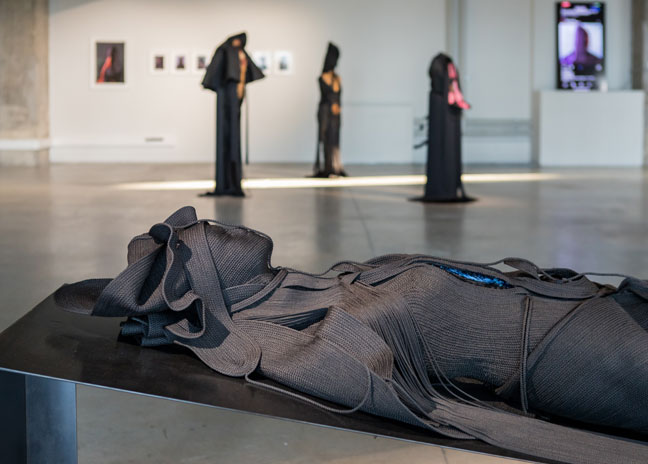
PSL: Could you describe the challenges of this first exhibition at Magasins Généraux?
This exhibition should be seen as an “open house” of my studio: all my pieces are presented, sometimes work in progress; others will be created during the exhibition.
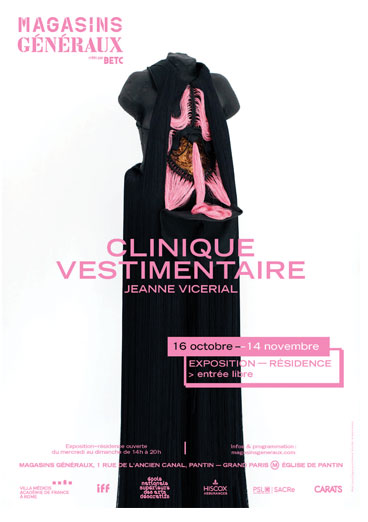
Jeanne Vicerial: The exhibition effectively reuses the title of my PhD dissertation, which was also the title of my degree at EnsAD and of my first theoretical paper. In fact, I have always kept the title "Clothing Clinic" until today to define the research space that constitutes my studio. The starting point for this first "Clothing Clinic" solo exhibition was to consider a second version of my dissertation defense. It is therefore intrinsically linked to research carried out as part of my SACRe doctorate. I defended my dissertation in 2019, while I was a resident at the Villa Medici in Rome. However, I only had twenty-four hours to present my work, too short a time to present its practical dimensions. Yet this happens to be a central aspect of my work. In research-creation, artists respond to hypotheses through practice.
With this exhibition, my desire was to present the practical issues of my research in a version conceived as an exhibition-residency which would take advantage of these last two years of hindsight, perhaps to go a little deeper and present their development. This exhibition project dates from 2019, but it had to be postponed twice because of the health crisis. I first met Anna Labouze and Keimis Henni, the artistic directors at Magasins Géneraux, at a vernissage. They knew my work and invited me for this exhibition around art, science and research. “Clothing Clinic” is an exhibition that talks about research and creation, but through the challenges of practice. This exhibition should be seen as an “open house” of my studio: all my pieces are presented, sometimes work in progress; others will be created during the exhibition. There are performances, interactive exhibits…it’s a real hands-on approach to the studio.
PSL: Can you say a few words about the way you work in collaboration between art science and design within the context of your work?
Jeanne Vicerial: The research enabled me to open up new perspectives, despite my fashion background, which is a very particular environment. The research, at least through design, allowed me to realize that you can develop a collaborative project between engineers, artists and designers quite easily. I have developed a completely collaborative practice, be it art, research or design. I continue to collaborate with the professors I worked with during my doctorate on the project COCREAT, where I am working with the engineer Philippe Faul, alongside whom I have been involved in the project for five years. In my dissertation I identified nearly a hundred collaborations.
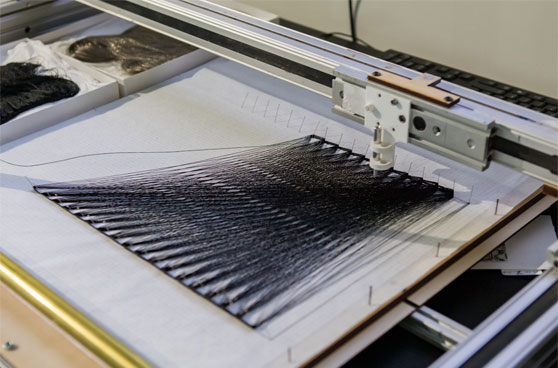
COCREAT Project:
Between knitting and weaving a yarn, COCREAT aims to develop anthropo-mechatronic technology for the manufacture of textile articles. The objective of this project is to develop new "made to measure" clothing and textile articles, that is to say according to anthropo-dimensional measurements, through either electronically or manually controlling the settings and operation of machines. Led by Aurélie Mosse, teacher and researcher at EnsadLab, and carried out by the Soft Matters research group, this project is one of the nine winners of the PSL Valorisation / QLife 2020 call for prematuration projects.
-> The 9 laureates of the 2020 proof-of-concept call for proposals by PSL Valorisation & Qlife
PSL: Can you present the program that accompanies the exhibition at Magasins Généraux, particularly in connection with PSL’s SACRe doctoral program and EnsadLab?
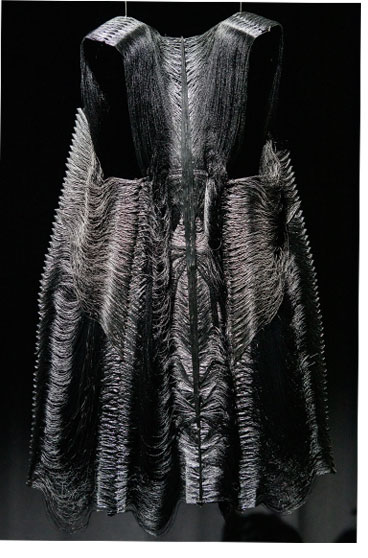
Jeanne Vicerial: There are indeed several events that accompany the exhibition: concerts, performances... There is also an event that is particularly close to my heart, namely an evening on the place of women in the art world with Contemporaines. I also invited the CARAT program for a research café with engineers and researchers who are developing processes for industry. Finally, a weekend dedicated to research, with an invitation to the SACRe seminar for an off-site session to talk about research perspectives opened by the project, with doctoral students and doctors and focused in particular on questions of writing and presentation in research-creation work. I have organized a day entirely devoted to the world of fashion, the body and clothing with round tables and an invitation to EnsadLab's “Soft Matters” research group, which I have been associated with since my doctoral dissertation. Not only have I invited doctoral students and doctors to talk about their work, but I have also decided to open up the space to other artists I collaborate with for discussion, in particular researchers at IRCAM, and also Hugo Servanin and Wendy Andreu who have developed a distinctly unique relationship with the body. It was important to me to be able to open these exchanges as widely as possible, including to the public who will come to visit the exhibition.
PSL: How do you see your journey between research and creation in your practice today and in your future projects?
Jeanne Vicerial: I am continuing my work as a researcher, in particular as part of the COCREAT project. Research remains a point of departure in my approach to projects. However, my practice as a plastic artist is increasingly asserting itself. I try to develop prototypes through research as unique pieces linked to the world of exhibitions that enable me to unblock certain issues arising in my research. I am also continuing the development of my “knitting” project, whose potential is infinite: poised between knitting and weaving, resembling lace and with stitchwork and needlework. My research involved developing a digitally controlled interactive tool to save working time. This came about because the work, which involved copying muscle anatomy drawings, was so time-consuming. Today we have developed validated machine prototypes that can do in seven minutes what I could do in seven hours by hand. This is how I envision continuing my practice, between research and creation.
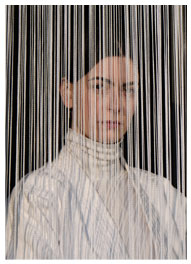
© Jeanne Vicerial
Jeanne Vicerial
After obtaining a Master’s degree in Clothing Design at the École des Arts Décoratifs in Paris in 2015, Jeanne Vicerial has been engaged in research-creation work. She later enrolled on PSL University's SACRe doctoral program and in 2019 defended her dissertation entitled "Clothing Clinic", prepared within the EnsadlLab. Resident at the Académie de France - Villa Médicis in Rome in 2019-2020, she has developed a work close to sculpture and has exhibited in Rome and at the Fondation Lambert in Avignon. In addition, her work has entered the collections of the Centre national des arts plastiques (CNAP) in Paris.
